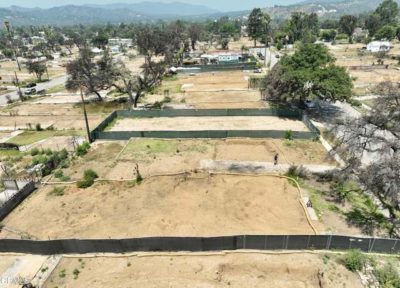Selling Land After the Eaton Canyon Fires: How a Top-Tier Real Estate Agent Supports You

1. Understand Fire‑Recovery Phases (USACE + EPA debris cleanup)
An experienced real estate agent navigates the two-step cleanup process:
Phase 1: EPA removes household hazardous materials (paint, propane tanks, batteries). This must be done before most rebuilding or redevelopment can proceed
Phase 2: US Army Corps of Engineers (USACE) removes ash, chimneys, foundations (if opted in), hazardous trees, and up to 6″ of soil. This work is conducted concurrently with EPA Phase 1 on the same properties.
USACE only does Phase 2 for those who have submitted a Right of Entry (ROE). An average lot’s cleanup takes 2–3 days.
What your agent does:
Confirms which cleanup phase your land is in and ensures your ROE form is submitted correctly. Coordinates with USACE and EPA representatives to confirm completion certificates—critical documentation for permitting and sale.
2. Verify Permits & Zoning with the City
First, your agent should coordinate directly with the city’s Land Use & Planning Department. Next, they must check the parcel’s zoning designation (e.g., RS, RM, CG) to determine which land uses the city allows or prohibits. Then, they should review the applicable rules for building, grading, and subdivision. Before proceeding, ensure that the raw land meets all city standards for the proposed development. Finally, verify specific clearance requirements, including fencing, setbacks, and manure management.
3. Confirm If “Horses Allowed” on the Parcel
Many buyers of rural land consider equestrian use. Your agent should check for overlay districts or hillside provisions that may restrict the use of large animals.
4. Reviews subdivision regulations under Title 16 of the Municipal Code. Any new lot must meet minimum size, frontage, utility access, and other requirements. Advise on lot split vs. planned unit development (PUD).
5. Market Strategically, Educated Buyers Attract Premium Offers
A savvy agent doesn’t just list—they educate prospective buyers on:
Comparable land sales after the fire can help establish a realistic price range. Targets qualified buyers: equestrians, developers, environmental builders, organic farms—showing feasibility and “permit-readiness.” By expertly handling these layers, the agent not only sells land, but they also create confidence and unlock your property’s full potential even after a wildfire.





Wow what an overwhelming transaction. I can’t imagine trying to do this without an expert assist